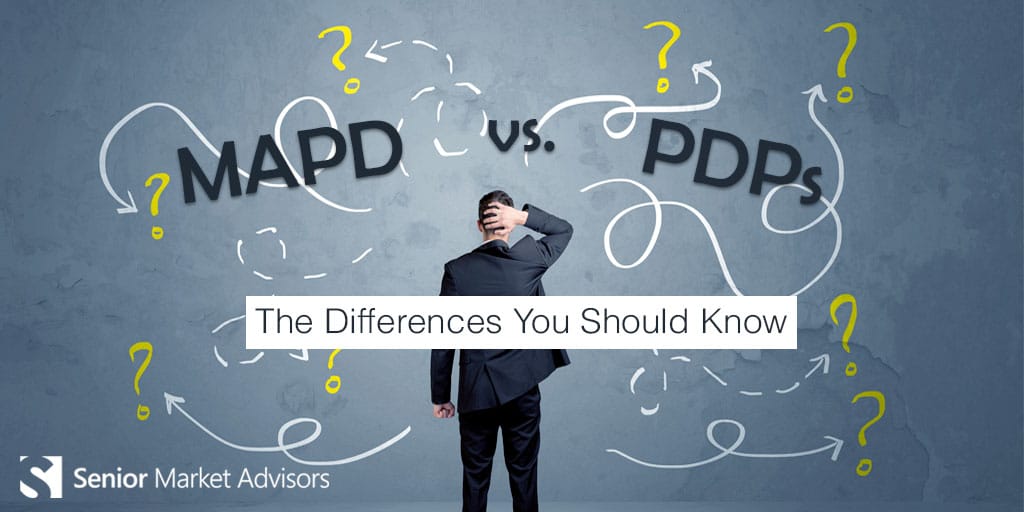AARP predicts that 79 million people will enroll in Medicare by 2030. According to the Kaiser Family Foundation (KFF), 42 percent of those beneficiaries will be enrolled in Medicare Advantage (MA or Part C) plans by 2028. That’s an enormous potential market for insurance agents currently involved in Medicare sales or those looking to become independent agents.
In this article we will help you better understand Medicare Advantage and how to start selling.
What are Medicare Advantage plans?
Commonly referred to as MAPD, these are health insurance plans offered by private insurance companies that offer the same benefits as original Medicare, and many times, more. They also commonly include prescription drug plans built in, hence the name, MAPD. (Medicare Advantage with Prescription Drug Coverage)
The reason these plans exist is to help reduce the burden of spend on the Medicare fund which is responsible for paying 80% of an eligible individuals medical and hospital expenses. So, the government pays the private sector to take over the liability of the 80% from Medicare, ultimately reducing the financial burden on the American tax payers. In turn MAPD plans offer the same benefits and sometimes more so they can help control their costs (the 80%) that Medicare is paying them to take over.
Why Sell Medicare Advantage Plans?

Typically, insurance carriers pay higher commissions for MA plans than Medicare Supplements or Part D plans as the commissions for MAPD plans are fixed and set by the Centers for Medicare and Medicaid Services (CMS) and adjust annually. You can read more about Medicare advantage commissions here.
A Medicare Advantage plan may offer your client the lowest cost for the benefits they want. For example, some plans have $0 monthly premiums and they offer benefits Original Medicare does not cover such as gym memberships.
Note: You’ll have the most sales success building a residual income book of business if you have all three products in your portfolio, because each type of plan serves different needs. For example, your clients may not want additional health benefits. A Medicare Supplement plan (Medigap plan) might work better for people who just want coinsurance or copays covered and less network restrictions. However, client’s can not have both an MAPD and Medicare supplement.
How to Sell Medicare Advantage Plans

Before you can start selling Medicare Advantage plans, you must receive the proper training, licensing, and certifications. Check with your state’s department of insurance to learn about state-specific requirements. After you’re licensed, the next step is marketing your services.
Licensing and Certification
Sales agents need to be licensed to sell Medicare plans in your state. Then you’ll need to contract with carriers. Most insurance carriers will require you to complete specific training along with AHIP certification.
Marketing Medicare Advantage Plans
While you can market Medicare Advantage (MA) plans yourself via direct mail, digital marketing through social media, or traditional marketing (media buying), that can be costly and time-consuming.
Another option is contracting with a Field Marketing Organization (FMO). Partnering with a FMO can mean you don’t have to spend your time creating marketing material and getting it out to your target client base. The right FMO can provide sales and marketing support to generate leads so you can focus on making sales rather than all of the behind-the-scenes work.
When you partner with a great FMO, you get access to MA plans from many carriers, rather than just one. That gives you the opportunity to offer your clients a variety of options and help them find the right fit.
When Can I Sell Medicare Advantage?
Many Medicare-eligible individuals have restrictions on when they can enroll in new plans. You need to know the specifics of each enrollment period and how they apply to your clients.
Initial Enrollment Period
Many people qualify for Medicare when they turn 65. They have an Initial Enrollment Period (IEP) from three months before their 65th birthday to the three months after, which is a total of seven months to enroll in Medicare for the first time. People who qualify for Medicare who have ALS, ESRD, or who have received SSDI for at least 25 months can enroll before they turn 65. The IEP for those people is the month following their diagnosis or 25th SSDI payment.
General Enrollment Period
Clients who miss their IEP can enroll in a Medicare Advantage plan during the General Enrollment Period, which is from January to March. They may have to pay a penalty, and their coverage won’t start until July 1, however, so it’s important that they enroll when they first have the opportunity. Note: This IEP is only for beneficiaries enrolling for the first time.
If your clients want to enroll in a Medicare Advantage Prescription Drug (MAPD) plan or a Medicare Part D (prescription drug) plan, they can enroll from April 1 to June 30. Your client must have both Medicare Part A and Part B to enroll in a MAPD, but they only need Part A or Part B to enroll in a Part D plan.
Annual Enrollment Period
The majority of your clients will have to wait until the Annual Enrollment Period (AEP), which is from October 15 to December 7 to switch from Original Medicare to a Medicare Advantage plan.
Open Enrollment Period
The Open Enrollment Period (OEP) also lasts from January 1 to March 31, but the only Medicare Advantage change your client can make is switching from one MA plan to another MA plan. Your clients can also drop MA coverage and enroll in a Part D plan to go with Original Medicare.
This means that if your clients enrolled in a MA plan during AEP and they hate it, they can switch. For you, this means another three months of commission possibility. However, be careful — it also gives your clients a chance to disenroll and take your commissions away. It is crucial that you truly enroll your clients in the best plan for them during AEP so that they don’t try to switch during OEP!
Plus, Medicare prohibits you from sending unsolicited marketing materials that mention OEP. You also aren’t allowed to target your AEP clients with mailings, calls, or other ways. You are, however, allowed to follow up with your AEP clients and ask how they like their plans. If they say, “I’m not happy with it,” you are allowed to meet and talk about plan options.
You are allowed to meet with your clients who enrolled during AEP if they explicitly ask for a meeting or information, however. You can also talk to someone about OEP if they ask about it.
Special Enrollment Period
Other clients may qualify for a Special Enrollment Period (SEP) if they have certain life changes like moving, losing coverage, financial eligibility, or chronic illnesses. SEPs may be temporary or life-long.
Clients with life-long SEPs may qualify for Special Needs Plans (SNPs), which are Medicare Advantage plans that are specific to certain health conditions and/or financial needs. They can make one change to their coverage per quarter from January to September.
Clients who qualify for both Medicare and Medicaid may qualify for MA plans called Dual Special Needs Plans (DSNP). Those clients can make changes during AEP, but the new coverage won’t take effect until the following January, and you must code the change as AEP rather than SEP.
Selling Medicare Advantage Over the Phone

You may have heard that you can sell Medicare Supplements over the phone, but you want to know how to sell Medicare Advantage plans over the phone.
The first step is completing AHIP and obtaining the proper insurance license in your state of residence. After you contract with Medicare Advantage carriers, you can sell by phone in your state any other state as long as you’re licensed in those states.
Important Terms to Know When Selling Medicare Advantage Plans
You want to answer clients’ questions with confidence, so it’s important to know the terms they’ll ask about. Here are some common terms beneficiaries will ask about:
- Appeal: A request for your health insurer or plan to review a decision or a grievance again.
- Allowed Amount: The maximum amount covered for health care services. Sometimes called “eligible expense,”payment allowance,” or “negotiated rate.”
- Balance Billing: When a provider bills the client for the difference between the provider’s change and allowed amount.
- Co-Insurance: An amount the client is sometimes required to pay for health care services or prescriptions after a deductible.
- Co-payment (Co-pay): An amount the client must pay as their share of the cost for health care services at the time of purchase.
- Deductibles: The amount that the client will have to pay for health services or prescriptions each year before their insurance beings to pay.
- Estimated Annual Cost: An estimate of the average amount the client might expect to spend each year for health coverage. The client’s out-of-pocket costs are based on typical health care for Medicare beneficiaries with the same age and health status. Also, if the client has limited income and resources, the client’s expenses may be lower. The estimate includes plan benefits (coverage) and costs for premiums, co-payments, deductibles, and co-insurance.
- Estimated Annual Drug Cost: An estimate of the average amount the beneficiary should expect to pay each year for prescription drug coverage. This estimate includes monthly premiums, an annual deductible, drug copayments/coinsurance, and drug costs not covered by prescription drug insurance.
- Out-Of-Pocket-Spending Limits: Protects the client by having yearly limits on their out-of-pocket costs for medical and hospital care. If the client reaches the limit on out-of-pocket costs, they continue to receive coverage for hospital and medical services. The insurance company will also pay the full cost for the rest of the year.
- Provider Network: The group of providers who can provide health care services to plan members.
Start Selling Medicare Advantage Insurance Today
Selling Medicare Advantage plans can be a lucrative career. At Senior Market Advisors, we give our agents tools for success such as extensive training so you can answer questions with confidence.
When you contract with us, you get access to plans from many of the major Medicare Advantage carriers available in the Medicare market. That’s a huge sales advantage because that means you can suggest plans that best suit your clients’ needs, rather than just any plan. Our experienced marketing team can help generate leads so you can focus on closing sales rather than finding people to call. Ready to start? Call us at 1-844-452-5020 or eContract with us today.



